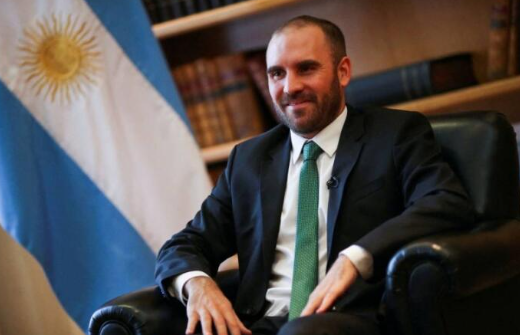Argentina's Economy Minister Martin Guzman, who is leadingdebt renegotiations with theInternational Monetary Fund , announced his resignation on Saturday, creating fresh uncertainty for Latin America's third-largest economy.
In a statement to President Alberto Fernandez, Guzman did not say why he resigned, but called on the center-left leader to mend internal divisions so that "the next minister will not suffer" the same difficulties he did.
"You have to get an agreement within the ruling coalition," he added in a statement shared on Twitter.

His resignation comes two weeks after Vice President Cristina Kirchner, a former president who has been critical of the administration, delivered a speech attacking Fernandez's economic management.
Political analyst Carlos Farah told AFP that Guzman's resignation was "a winning formula for presidential autonomy" and gave Kirchner the upper hand in their power struggle.
"The resignation will have a very bad impact on the markets. Even if the president and the vice president agree on managing the economy, from now on everything will be conditional on Christina Kirchner's pressure."
As economy minister, Guzman, 39, is tasked with renegotiating a $44 billion (RM194 billion) debt that Argentina insists it cannot repay.
The original $57 billion debt — the last of which Fernandez reduced after succeeding his liberal predecessor Mauricio Macri — wasthe largest debt ever issued by theIMF .
Despite resistance from Kirchner, Guzman managed to reach a deal that saved Argentina from defaulting.
But Guzman has often faced hostility from Peron's Justice Party, the main force in the Frente de Todos (French Front) ruling coalition, which counts both Fernandez and Kirchner as high-profile members.
Kirchner's faction has been going after Guzman since the All Front lost control of the Senate in last year's midterm legislative elections.
The IMFdeal was only approved by parliament with the backing of the center-right opposition asa group of lawmakers in the ruling coalition led by the vice president's son Maximo Kirchner boycotted the vote .
"Growth Crisis"
Whoever succeeds him, Guzman said, will need "centralized management of the necessary macroeconomic and political tools to consolidate progress made and address future challenges."
While agricultural powerhouse Argentina has Latin America's third-largest economy, it has been in economic crisis for years, with inflation exceeding 60 percent in the past 12 months.
Before the coronavirus pandemic exacerbated the problem, the country was already battling rising poverty, rising unemployment and a weakening currency.
Earlier this week, Fernandez admitted that the country was facing a "growth crisis" due to a shortage of foreign currency.
The IMF agreement includes provisions to control inflation and reduce the budget deficit from 3 percent in 2021 to parity in 2025.
Critics of Guzman within the ruling coalition slammed him for being overzealous in tackling budget deficits and monetary policy.
He has repeatedly complained that the criticisms have given worrisome signs to an already tight market, making his job more difficult.
Eurasia Group political risk consultancy said in a recent report that internal disagreements would not be resolved anytime soon.
"Infighting within the government will continue to worsen, further compromising the government's ability to develop a coherent policy plan," Eurasia said.
While he did not reveal what his next position would be, Guzman said he would "continue to work and fight for a fairer, freer and sovereign home."
Fernandez has yet to comment on the resignation of Guzman, one of his closest allies.




